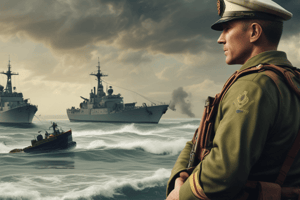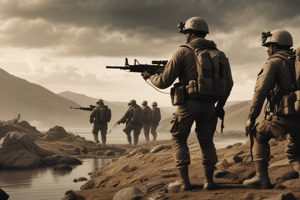Podcast
Questions and Answers
What is the primary focus of Section 3 of the interview?
What is the primary focus of Section 3 of the interview?
- Determining your motivations for joining the Royal Marines
- Assessing your knowledge of the Royal Navy and Royal Marines (correct)
- Evaluating your personal life experiences
- Testing your physical fitness and endurance
What type of documents are you required to present during Section 4 of the interview?
What type of documents are you required to present during Section 4 of the interview?
- Medical records and vaccination certificates
- Character references and letters of recommendation
- Financial statements and tax returns
- Identification documents and educational qualifications (correct)
Which of the following statements is true?
Which of the following statements is true?
- Most of the interview consists of open-ended personal questions (correct)
- The interview is divided into two sections only
- The interview focuses primarily on specific knowledge about the Royal Marines
- Physical fitness tests are a mandatory part of the interview process
What type of questions might be asked in Section 3 about the Royal Marines?
What type of questions might be asked in Section 3 about the Royal Marines?
What advice is given regarding the presentation of documents in Section 4?
What advice is given regarding the presentation of documents in Section 4?
Which of the following statements is NOT mentioned in the text?
Which of the following statements is NOT mentioned in the text?
What aspect of the candidate's life is assessed during the section about family?
What aspect of the candidate's life is assessed during the section about family?
In Section 2 of the interview, what personal aspect might the interviewer inquire about?
In Section 2 of the interview, what personal aspect might the interviewer inquire about?
Why does the interviewer want to know about the candidate's family members' careers?
Why does the interviewer want to know about the candidate's family members' careers?
What is one of the potential questions the interviewer might ask related to the candidate's family?
What is one of the potential questions the interviewer might ask related to the candidate's family?
Why is it important for the candidate to be honest in their responses during the interview?
Why is it important for the candidate to be honest in their responses during the interview?
How can the candidate effectively prepare for questions regarding personal motivations?
How can the candidate effectively prepare for questions regarding personal motivations?
Study Notes
Introduction
The Royal Marines interview is a crucial step in the recruitment process for aspiring candidates who wish to serve in the Royal Marines. Preparing for this interview involves understanding the specific questions that will be asked and being familiar with the Royal Marines' policies, training modules, and culture. This article aims to guide you through the different sections of the interview, providing examples of potential questions and answers to help you prepare effectively.
Section 1: Your Home Life and Family
During this section, you will be asked about your responsibilities at home, your family, and their careers. Questions like "What does your father/mother/brother/sister/partner think about you joining the Royal Marines?" or "Where does your father/mother/brother/sister/partner live?" are common. The interviewer wants to assess your support system and independence. Be prepared to discuss your parents' relationship, whether you have a boyfriend/girlfriend, and your experiences living with family members.
Section 2: Personal Questions
In this section, the interviewer may delve deeper into your personal history and motivations. For instance, they might ask about your time at school or your preparations for joining the Marines. They may also inquire about your experience participating in sports, extra responsibilities at work, or any previous military service within your family. Be honest and straightforward in your responses.
Section 3: Royal Navy and Royal Marines Specific Questions
These questions aim to gauge your knowledge of the Royal Navy and Royal Marines. Topics may include the organization's history, current operations, future plans, and specific aspects like cap badges, corps colors, and rank structures. Examples might be: "What is the Royal Marines’ birthday?", "Name some Victoria Cross winners from the Royal Marines", or "What are the four commando qualities/values?". Brush up on these topics beforehand to perform well in this section.
Section 4: Presentation of Documents
The final part of the interview requires you to present documents proving your identity and educational background. Ensure you bring all necessary certificates, such as passports, birth certificates, GCSEs, A-Levels, BTECs, and university degrees. Be patient during this process, as it may take some time.
Conclusion
Remember that most of the interview consists of open-ended personal questions about you and your life, while specific questions about the Royal Marines usually come later. By preparing thoroughly and anticipating these question categories, you'll be better equipped to succeed in your Royal Marines interview. Good luck!
Studying That Suits You
Use AI to generate personalized quizzes and flashcards to suit your learning preferences.
Description
Prepare effectively for the Royal Marines interview by understanding the sections, questions, and topics that may be covered during the recruitment process. This guide provides insights into home life and family questions, personal inquiries, Royal Navy and Royal Marines specific topics, and the presentation of necessary documents. Be equipped with the knowledge and tips to succeed in your interview.




